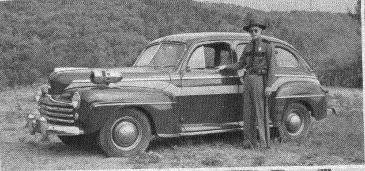The
Vermont
State
Police
Shoulder
Patch
The Vermont State Police shoulder
Patch is a modification of the Great Seal of Vermont and the State's Coat
of Arms originally designed by Ira Allen of the Green Mountain Boys' fame.
The mountain peaks are Camel's Hump
and Mount Mansfield as viewed from a point opposite Burlington.
It is believed that Samuel de Champlain,
the "Discoverer" of Vermont, first saw the area from that vantage point.
The view also serves as a constant
reminder of the beauty of the Green Mountains.
The tall pine tree represents one
presumably visible from the windows of the home of our first head of state,
Governor Thomas Chittenden.
The wooded hills stand out sharply
as they do in actuality on a bright October day.
Beneath the hills are sheaves of
grain and a grazing cow depicting Vermont's agricultural and dairying industries.
And above it all is a deer's head attesting to the State's abundant wild-life.
 The
Vermont
State
Police
Shoulder
Patch
was adopted in 1947 by Major General Merritt A. Edson, the first Commissioner. The
Vermont
State
Police
Shoulder
Patch
was adopted in 1947 by Major General Merritt A. Edson, the first Commissioner.
1947 Ford Cruiser
- 85 hp Flathead V-8

|
The
Vermont
State
Police
History
Vermont was one of the last states
in the Union to create a state law enforcement agency. Prior to the organization
of the Vermont State Police, the law enforcement system of Vermont relied
almost entirely on the fourteen county sheriff's depart- ments and the
twelve local police departments found in the larger cities and towns of
the state.
The first form of state law enforcement
in the United States was the Texas Rangers, established in 1835. It was
not until 1935-one hundred years after this first "state police" force
was established- that the Vermont Legislature of 1935 soundly defeated
a proposal that would have created a Department of Public Safety, though
it did order that a two-year study on the matter be undertaken.
The two-year study undertaken by
a three-man committee of the 1935 Legislature was presented to the Legislature
of 1937. This report not only revealed the deficiencies of the law enforcement
system that existed in Vermont at that time, but gave a strong support
to the creation of a Department of Public Safety.
The Legislature of 1937 overwhelmingly
defeated a bill that would have created this much needed organization.
The idea for the creation of a state
police force remained dormant for ten years, until the members of the Legislature
were preparing for their annual trip to Montpelier, in 1947.
In December, 1946, a Bennington
college co-ed disappeared while hiking the Long Trail. After a month of
investigating and searching no trace of her could be found. The father
of the girl who disappeared perhaps pinpointed the problem in a public
statement... "The difficulty however, is that there is no organized police
system within the State..." No trace of the girl, no sign of a body, clothing,
or any other evidence was ever found.
The Public's reaction to the ineffectiveness
of the county centered system of rural law enforcement was shown when the
proposal to create a Depart- ment of Public Safety was introduced in the
1947 Legislature, and overwhelmingly passed.
The Department of Public Safety
ws created July 1, 1947. It began with twenty-seven highway patrolmen who
transferred from the Motor Vehicle Department and thirty probationary troopers.
|